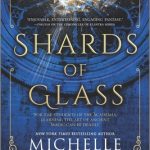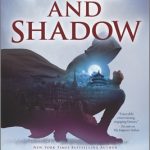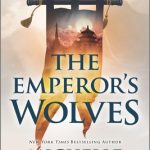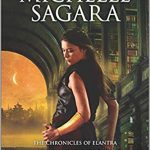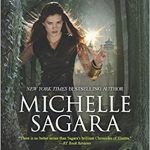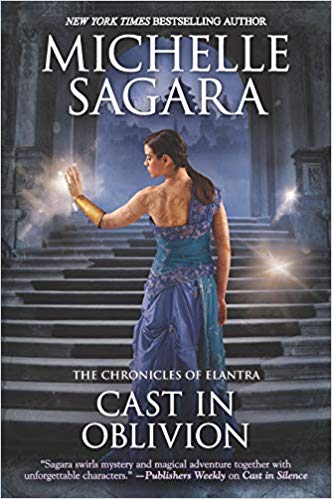 Cast in Oblivion (The Chronicles of Elantra, #14) by Michelle Sagara
Cast in Oblivion (The Chronicles of Elantra, #14) by Michelle Sagara Format: eARC
Source: supplied by publisher via Edelweiss
Formats available: paperback, ebook, audiobook
Genres: epic fantasy, fantasy
Series: Chronicles of Elantra #14
Pages: 544
Published by Mira on January 29, 2019
Purchasing Info: Author's Website, Publisher's Website, Amazon, Barnes & Noble, Kobo, Bookshop.org
Goodreads
POLITICS ARE HELL
Kaylin wasn't sent to the West March to start a war. Her mission to bring back nine Barrani might do just that, though. She traveled with a Dragon, and her presence is perceived as an act of aggression in the extremely hostile world of Barrani-Dragon politics. Internal Barrani politics are no less deadly, and Kaylin has managed--barely--to help the rescued Barrani evade both death and captivity at the hands of the Consort.Before the unplanned "visit" to the West March, Kaylin invited the Consort to dinner. For obvious reasons, Kaylin wants to cancel dinner--forever. But the Consort is going to show up at the front door at the agreed upon time. The fact that she tried to imprison Kaylin's guests doesn't matter at all...to her.A private Barrani Hell, built of Shadow and malice, exists beneath the High Halls. It is the High Court's duty to jail the creature at its heart--even if it means that Barrani victims are locked in the cage with it. The Consort is willing to do almost anything to free the trapped and end their eternal torment. And she needs the help of Kaylin's houseguests--and Kaylin herself. Failure won't be death--it's Hell. And that's where Kaylin is going.
My Review:
Things are like other things. The stories we’ve read in the past affect how we view the stories we read in the present. There was a point in Cast in Oblivion where one of the characters describes Ravellon as the spike that is holding all of the parallel worlds together and I had an OMG moment and realized that Ravellon might be Amber. In Roger Zelazny’s incredible epic/urban fantasy series, beginning with Nine Princes in Amber, Amber is the one true world and all the other worlds, including ours, are mere shadows of it.
Ironically, in Elantra, Shadow seems to come out of Ravellon. But the analogy might still hold. Or hold enough to serve as metaphor. Which is an often raised topic in Cast in Oblivion, as so much of what Kaylin experiences is described as being a metaphor. She doesn’t see the world the way the others in her life – and even in her house – even the house itself – see it. And while her metaphors are frequently frustrating to her companions, and often not strictly true, they usually turn out to be right.
For select values of right. Generally right enough to fix whatever has recently gone wrong – even if, or occasionally especially because, Kaylin is at the heart of what went wrong in the first place. At least she often feels like it is. And that idea, like Kaylin’s metaphorical view of her circumstances, may not be strictly true, they are also usually right – or at least point her in the right direction.
Sometimes like a knife.
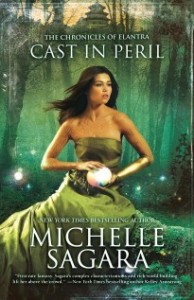 The Chronicles of Elantra by this point, 14 books in, is a densely packed epic fantasy. Packed to the point where no reader could possibly start here and have any of it make sense. Because this book in particular feels very insular – in the sense that the events and issues that are at the forefront in Cast in Oblivion have been bubbling along since book 8, Cast in Peril – if not before. In fact, much of the action in every book since Cast in Peril has its roots in the journey that begins in that book.
The Chronicles of Elantra by this point, 14 books in, is a densely packed epic fantasy. Packed to the point where no reader could possibly start here and have any of it make sense. Because this book in particular feels very insular – in the sense that the events and issues that are at the forefront in Cast in Oblivion have been bubbling along since book 8, Cast in Peril – if not before. In fact, much of the action in every book since Cast in Peril has its roots in the journey that begins in that book.
In other words, don’t start here. If any of the above or below sound interesting, start with either the prequel novella, Cast in Moonlight, or the first book in the series, Cast in Shadow.
At the beginning of the series, it felt like urban fantasy, albeit urban fantasy set in a high fantasy world. As the series, and Kaylin, have evolved, it has become an epic fantasy, with Kaylin Nera, human, mortal, flawed, young and “Chosen” as the point of view into a world that is run by “people” much more powerful than she. Kaylin is always operating way above her weight class and suffering through impostor syndrome at every turn.
She’s awesome, not because she’s powerful, but because she never stops trying – no matter how scared she is or how many of those powerful people either underestimate or overprotect her at every turn.
In the end, this is a story about friendship, and the heights and depths that people can and will reach in its name. It’s also a story about family-of-choice and the ties that one chooses to bind oneself with.
And it’s about the power of truth and honesty. And especially about the dangerous nature, and painful truth, of the power of choice.
Escape Rating A-: I love this series, but you can’t get into it here. And I’ll confess that it takes a while each year to get back into it. The story is like a spider’s web, sticky and interlocked at every turn.
It’s also difficult to review. I can say that I love this series, and I do, but that’s not informative. Trying to say why I love this series is awkward. But I’ll try.
I do love a highly convoluted political fantasy, and this series has certainly become that. The Barrani, who are this series equivalent of elves (sorta/kinda) are immortal. They hold grudges for millennia. As do their ancestral enemies, the dragons. Who are also immortal. And currently ruling the empire the Barrani are part of.
The part of the story that we are in revolves around family politics and a sibling rivalry that has literally gone on for centuries. But even though the Barrani are immortal, it has not made them wise – not in any way.
Kaylin is in the position that she is in because one Barrani hoped against all hope that she might be able to save his brother. The brother that he became outcaste for – and that word means exactly what you think it means. And this in a society where people are much more likely to kill their siblings than either love or trust them.
This series also has its roots in urban fantasy, complete with the requisite snark – although that snarkitude has become oddly similar to that in both J.D. Robb’s In Death series and Lindsay Buroker’s Emperor’s Edge series. It’s the kind of smirky and sometimes gallows humor that draws its rueful chuckles from how much we have come to know, and care for, these characters. They aren’t telling jokes, they are telling on each other – with honest love, honest regard and occasionally an honest desire to put one over on their friends and frenemies.
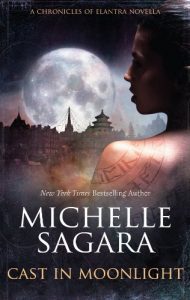 But in the end what draws me back to this series is the character at its heart, Kaylin Nera. She began the series in Cast in Moonlight attempting to commit a really grand suicide by cop, only to find herself adopted instead of imprisoned.
But in the end what draws me back to this series is the character at its heart, Kaylin Nera. She began the series in Cast in Moonlight attempting to commit a really grand suicide by cop, only to find herself adopted instead of imprisoned.
She is a character who has broken far, far out of her original setting in the crime and shadow riddled fiefs – where she learned to keep her head down and became one of the criminals. At first, she seemed as if she was just plain grateful to have become a very young and very immature Hawk, one of the law enforcers of this world. But her circumstances keep forcing her to become more, and her internal voice is the scared, uncertain yet determined voice of anyone who has ever come so far and so fast from where they began that they are just certain that it all not merely can be taken away, but should.
And she tries anyway.
One final note, one of the interesting themes in this particular entry is about the power, and the responsibility of choice, and just how different that perspective of choice is depending on where the chooser stands on any scale of wealthy, poverty, power and responsibility. Kaylin knows that in her early life, even her terrible decisions were her choice. Her alternative choice to committing the crimes of her early years was death, but it was still her choice. The Adversary of this story is not, strictly speaking, evil. Instead, it offers choices to people who choose to take a path that seems evil in pursuit of power. But the choice, and the offering of that choice, is not evil in and of itself – only the result.
I’m still thinking about that, and probably will be when the untitled 15th book in this series comes out, hopefully this time next year. And not nearly soon enough.









